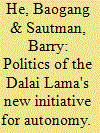| Srl | Item |
| 1 |
ID:
073845


|
|
|
|
|
| Publication |
2005.
|
| Summary/Abstract |
Hanoi promotes itself both as a place for foreign investment in urban development and as the 'cradle of Vietnamese civilisation'. Special status is given to places of national heritage significance, and policy makers and planners face challenges of balancing heritage conservation and modern development. By contrast, the former capital, Hue, continues to decline economically relative to other Vietnamese cities and is discovering value in its imperial heritage as a 'vector for development'. These Vietnamese capital cities demonstrate that heritage conservation is a key consideration in government efforts to improve the position of their constituencies in the newly-shaping global and national economic systems.
|
|
|
|
|
|
|
|
|
|
|
|
|
|
|
|
| 2 |
ID:
073843


|
|
|
|
|
| Publication |
2005.
|
| Summary/Abstract |
This paper represents an attempt to show how globalization is interacting with local political and social forces in the shaping of Southeast Asian capital cities. Southeast Asia is known for the political and economic dominance of its capital regions. In the recent two decades, the concentration of government, expenditures, services and amenities in the capital city has been reinforced by new foreign investments and international migration. The paper introduces three papers which examine the tensions and promises globalization brings for the capital city. It concludes with the challenge national governments face to balance spatial policies that strengthen the competitiveness of its capital regions with redistributive policies that are needed to develop subregions in the shadow of globalization.
|
|
|
|
|
|
|
|
|
|
|
|
|
|
|
|
| 3 |
ID:
073844


|
|
|
|
|
| Publication |
2005.
|
| Summary/Abstract |
The rise of civil society and the breach of urban space by global finance and retail capital are creating new dynamics in the capital city as its spaces for local and national social and political life are marginalized by world city formation and commodification of urban space for global accumulation. Case studies show that the active participation of civil society in the public sphere is crucial to sustaining and producing new community and civic spaces in the face of these trends.
|
|
|
|
|
|
|
|
|
|
|
|
|
|
|
|
| 4 |
ID:
073846


|
|
|
|
|
| Publication |
2005.
|
| Summary/Abstract |
In the late 1980s, the Dalai Lama first asserted that he was willing to no longer press for an independent Tibet. Until recently, however, scant progress was made toward negotiations between the Tibetan exiles and the government of the People's Republic of China: the PRC had shown no inclination to negotiate about matters beyond the Dalai Lama's own status, while the exiles had insisted that China renounce all control over affairs in Tibet, except foreign affairs and defense. In 2002, largely in response to external pressures, China invited one of the Dalai Lama's brothers to visit Tibet and in 2002-2005 the Dalai Lama's representatives have visited Tibetan areas of China on three occasions and, most recently, have met with PRC representatives in Switzerland. The Dalai Lama has since gone some way toward accommodating PRC pre-conditions for negotiations. He has acknowledged that Tibet is part of China and Tibetan culture part of Chinese culture, as well as refocusing his concerns away from political demands to questions of cultural and religious autonomy. Formidable obstacles to negotiations remain, including exile demands that they be about unification of all PRC Tibetan areas and the establishment of liberal democracy in Tibet. Compromise solutions are available, however, and China can take a number of steps that would facilitate acceptance of compromise in the exile community and that would substantially benefit Tibetans in Tibet.
|
|
|
|
|
|
|
|
|
|
|
|
|
|
|
|